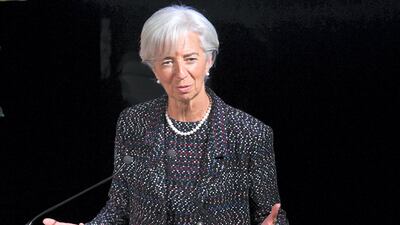The head of the IMF said that there is no reason for Arab countries to continue subsidising energy and that such subsidies come at the expense of much needed investment in health, education and other public services.
"There is really no excuse for the continued use of energy subsidies," Mme Lagarde, the IMF's managing director, said at a meeting of Arab finance ministers in Dubai on Saturday. "They are extremely costly – averaging 4.5 per cent of GDP among oil exporters and 3 per cent of GDP among oil importers, despite lower oil prices. They lack transparency – subsidies are often implicit and off budget. They are vastly inequitable – favouring the wealthy, who consume a lot of energy."
Many GCC countries reduced energy subsidies in the wake of the oil price crash that began in 2014 and which saw the price of crude shed more than two thirds of its value before rebounding over the past year. Net oil importers have also reduced energy subsidies in recent years to help ease the strain on government finances. Egypt, the Arab world's most populous nation, reduced energy subsidies in November 2016 to unlock a $12 billion IMF loan.
Arab countries accounted for more than a quarter of global energy subsidies in 2015, estimated at $117bn out of $436b world-wide, according to IMF statistics. Of that, Arab oil exporters accounted for $94bn of those subsidies, or about 5.5 per cent of their GDP, according to the organisation.
__________
Read More:
After five years, VAT rate may need to rise, IMF official says
Saudi Arabia pursuing an appropriate fiscal balance target, IMF mission chief says
__________
Ms Lagarde lauded, however ,the UAE and Saudi Arabia for introducing VAT this year but said there is scope for GCC countries to do more to raise domestic revenues. Unless fiscal policy is put on a sustainable path, rising debt will overburden the younger generation in the future, especially as government spending in the GCC is especially high where and above the emerging market average, Ms Lagarde said. In some cases in the region, government spending is close to 55 per cent of GDP.
Obaid Humaid Al Tayer, UAE Minister of State for Financial Affairs, echoed some of Ms Lagarde’s sentiments at the meeting, saying that Arab governments have their work cut out for them amid a challenging environment.
“Arab finance ministries and financial institutions today are facing major challenges,” said Mr Al Tayer, who opened the forum. “Among these is how to meet the requirements of their role as enabler for economic growth and financial inclusion in line with available budgets, and to borrow within the reasonable limits that do not exceed financial safety standards, so that borrowing does not come at the expense of the next generations’ standard of living.”
As well energy subsidies, Ms Lagarde also took aim at the public wage bill. She said a large public sector wage bill in the Arab world is a burden because of the cost to the government and the inefficiencies it creates due to "cronyism".
"Ultimately, the common good is ill-served by a system of patronage that hurts productivity and heralds privilege, by the corruption that comes from putting cronyism and ahead of capability," she added.
"This system disposes of good talent, and it reduces incentives to invest in skill and knowledge – the drivers of long-term growth. It can magnify the sense of dissatisfaction, distrust and resentment – and it is ultimately self-defeating."
Ms Lagarde noted, however, that through the use of digital technologies, governments around the region have been able to become more efficient and reduce corruption. With greater efficiency, governments will be better placed to divert more funds on much-needed infrastructure such as schools and hospitals.
"In India, the transfer of social benefits to biometrically-linked accounts was crucial to reducing leakage from subsidies, while in South Africa, moving to biometrically-secured debit cards for social transfer payments greatly reduced fraud and corruption," she said.
Mr Al Tayer said that bringing about more efficiency in the business of government is a better alternative to raising more taxes.
"Governments face challenges such as how to use the digital revolution to tackle development problems in innovative ways, and how to tackle resistance to adopting new technologies. While it is important to diversify government revenues to achieve fiscal sustainability, it does not mean that consumers and businesses are burdened with more taxes, which may negatively affect their standard of living or competitiveness,” he said.
“On the contrary, the solution lies in improving the efficiency of government spending and tax collection.”

